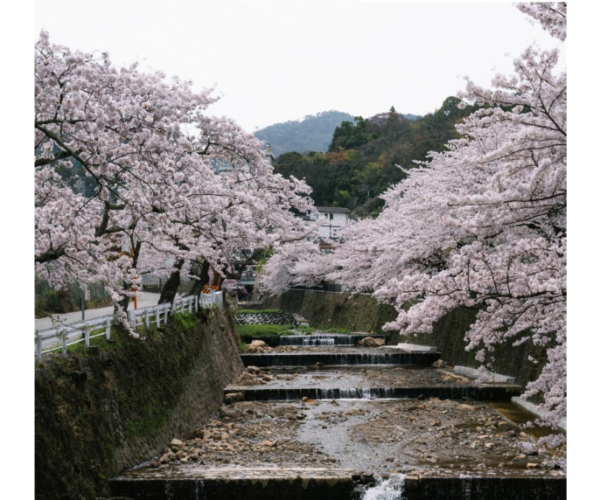This article originally appeared in the November 2022 issue of CONNECT.
Personal Notes on Mental Health and Moving Abroad
Teddy Clayton (Toyama)
I don’t think anything could compare to the way I felt during the first few days in my apartment, located in a small town lying on the outskirts of Toyama City. The blurry, frozen images of a sleepy Japanese town that Google Earth had so kindly shown me prior to my arrival did little to prepare me for the real thing.
After dragging my woefully jet-lagged self around the town to sort out essentials, the gravity of my situation truly set-in the moment my apartment door closed behind me. I was finally left with nothing but the sound of my own breath amongst the cries of cicadas leaking in through my window. Then the real challenge began.
Being alone in a foreign country as unique as Japan, and knowing it’s going to be your home for the foreseeable future, is a feeling I don’t think anyone could have prepared me for. Those who are well-traveled or have previously faced the mental strain of moving abroad for an extended period will perhaps not encounter such a daunting and overwhelming sensation.
To let the tears and feelings flow, to face up to and accept the true magnitude of the situation, and to recognise that it’s okay to be upset is the grandest advice I could give to those who find themselves tense upon arrival in Japan.
As for myself, like many others I had recently turned 21, did not know a lick of Japanese, and had never spent longer than two weeks outside my home country, the U.K. The challenge that lay before me had never felt more real as I stood silently in my kitchen. So, what did I do to counter the overwhelming dread that began to squeeze my chest with increasing tension? I went to bed, slept for thirteen hours, woke up the following day to the mid-morning sun and a magnificent view of the mountains from my window, and then I cried.
That, as strange as it may sound, was the first step I took to countering the phantom pain grasping my chest. To let the tears and feelings flow, to face up to and accept the true magnitude of the situation, and to recognise that it’s okay to be upset is the grandest advice I could give to those who find themselves tense upon arrival in Japan. Once the tears had run their course, I felt the grip ever-so-slightly loosen around my lungs. I knew, in that moment, that the indiscernible pressure mounting on my mental health was, in fact, conquerable and that certain steps could be taken to combat it. The first of which was identified thanks to a few tears here and there: to accept that there is an issue to be addressed in the first place.
The next week or so was spent establishing a routine; a technique that—I’m sure all of us would agree—is a powerful way of keeping the everyday scaries at bay. However, for me this went beyond finding the best time and place to go for a weekly groceries haul, or knowing how to plot the day around cooking, eating, sleeping, and the dreaded garbage disposal schedule.
After establishing a routine, you may find yourself tempted to try new methods to maintain mental well-being that you haven’t had to employ previously. This is perfectly fine. Something I found helpful was simply finding the time to ask myself, “Am I doing alright?” It is harder than it sounds, especially when day-to-day activities vary in intensity throughout the week and can sometimes dominate your time. Once the question is asked, it is even harder to find the best way to answer it. Everybody’s answer is different and there are many possible solutions for each individual, so I will tell you what has worked for me when I answer, “No, today I am not doing alright.”
Keeping a diary is not something for everyone, myself included. The level of commitment required to record all actions and feelings on a day-to-day basis is not something that many can maintain, for various reasons. Forcing yourself to keep up can be more frustrating than therapeutic. I have found, however, that noting down my thoughts and feelings every now and then, or simply when I felt as if I had no other outlet for them, is the best method to keep the tension at bay.
It doesn’t have to be a specific diary or blog, or take up a designated time during your day. Any form of documentation is valid. First comes realizing the moment it’s needed, and then putting the pen to paper, fingertips to keyboard, or voice to microphone. Once you start, it can be hard to stop. Having something you can carry with you and quickly spill some thoughts into when a friend or family member isn’t available is something I would suggest to anyone struggling with their mental health.
Others may find sanctuary in physical fitness, engaging in a hobby, or conversing with loved ones; all these methods and more are completely valid steps to take in order to counter problems and flourish here in Japan. The key, in my opinion, is to have a reliable method of mindfulness that can be easily integrated into your daily routine if you find the answer to the daily question “Am I doing alright?” less favorable than you had perhaps hoped.
Aside from concentrated efforts and methods to improve mental well-being, I’ve found that relieving tension can also be achieved through celebration of the little victories. We all have moments where a list of tasks is laid before us, but the body doesn’t want to move to complete them. Those moments will come in Japan, and they may even feel more potent than normal. That is why it is so important to always commend yourself for any task achieved, big or small, because you deserve it. We have flown miles away from home and are working in a foreign country so different that “culture shock” is a common issue. So, yes, you should feel proud of yourself for any and all tasks completed in a day, no matter how small.
Something as simple as making it through an interaction with a local, no matter how smoothly or roughly you felt it went, is still an interaction you engaged in, and for that you should be proud. Waking up, getting up, and getting out there is a triumph to be celebrated. The only thing stopping you is a door that you—I should hope—have the keys to.
Teddy Clayton is a first–year ALT from the U.K. living in Toyama Prefecture. As a 21–year–old recent graduate, he can provide insight into the challenges and experiences that the JET Programme offers. In his free time he enjoys reading, writing, and izakaya hopping to meet the locals.



![CONNECT ART ISSUE 2024 SUBMISSIONS [CLOSED]](https://connect.ajet.net/wp-content/uploads/2024/04/ARTISSUE-INSTA-600x500.png)





